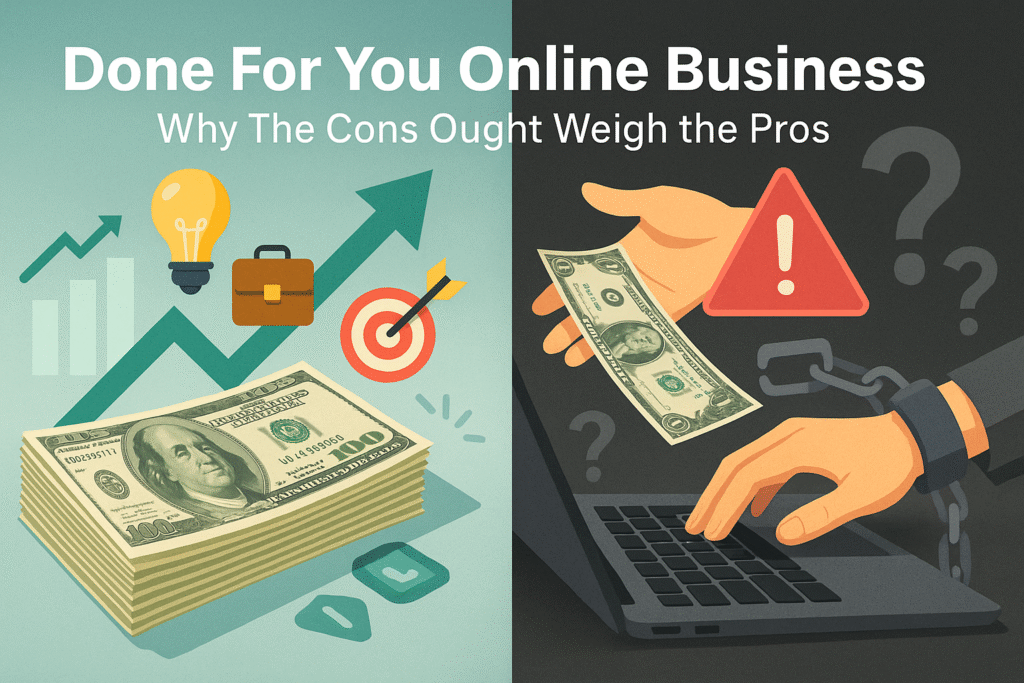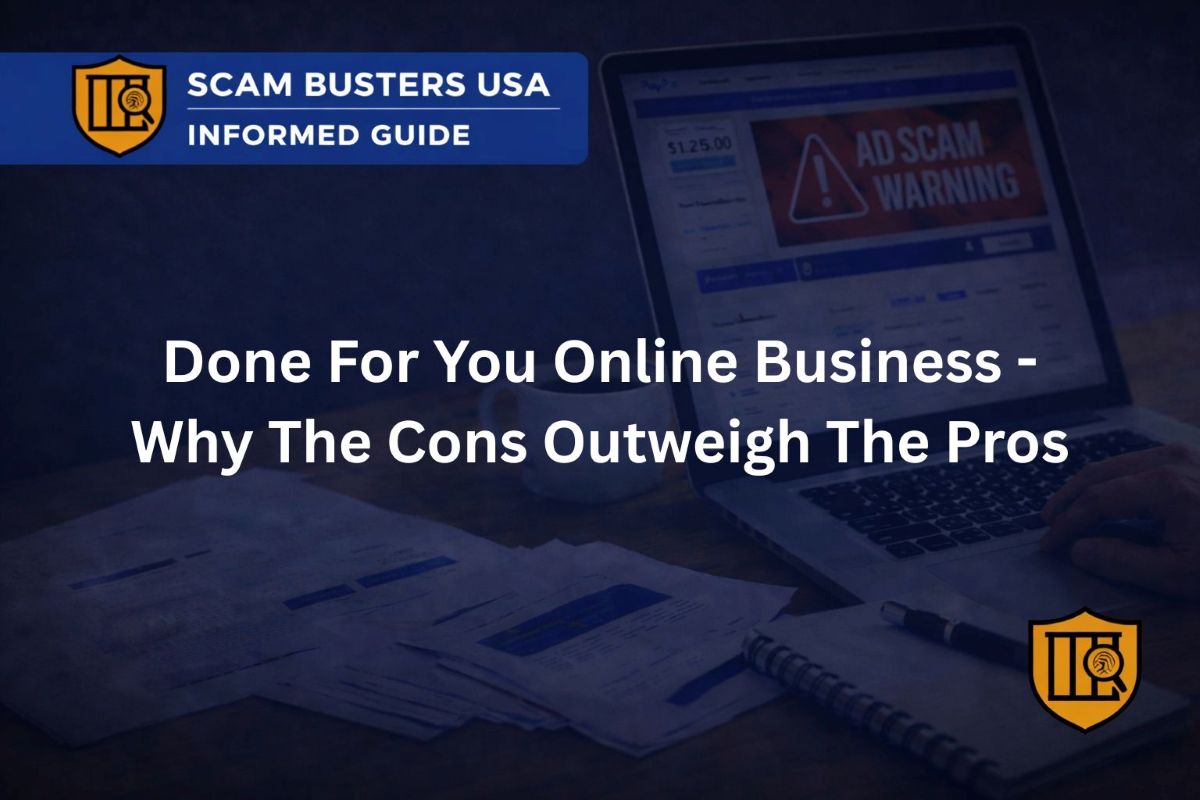Done For You (DFY) online businesses have been marketed as the ideal shortcut to success for aspiring entrepreneurs, promising all the benefits without the usual hustle. The appeal is simple: No need to sweat over details like website creation or product sourcing. Just plug and play, right?
The ads for these businesses paint a picture of simplicity and ease, where all you gotta do is drive traffic to a prefabricated sales funnel page. And let’s admit, the idea of having experts set everything up sounds pretty tempting, especially when you’re new to the game and feeling overwhelmed by all the tech jargon.
But hold up, before you get too excited diving into this world, it’s crucial to understand what’s really going on. My first brush with this concept was back in 2011 with Plugin Profit Site. They dangled a free affiliate page and promised seamless setup. It sounded amazing! Yet, as I soon discovered, there’s more lurking beneath the shiny promises. Check Out My #1 Recommendation and build your new online business on a solid foundation tha actually works.
This model capitalizes on the desire to save time, which is understandable because who doesn’t want that? But as they say, if it seems too good to be true, it probably is. Not knocking the whole concept, but I quickly realized that understanding the deeper workings of your own business can’t be outsourced.

Unveiling the Limitations and Challenges
Alright, so let’s break down some of the less glamorous truths about these Done For You setups. First up, the idea of a ‘turnkey solution’ is often a myth. The dream is sold as plug-and-play, but in reality, turning that key often involves hidden steps and complexities.
One major snag is the lack of personalization. You end up with a cookie-cutter business that doesn’t quite reflect your unique flair or vision. It feels more like renting than owning. You’re building someone else’s brand rather than your own, and that’s a big missed opportunity.
The ongoing costs can start piling up. Sure, the initial setup might be free or low-cost, but there’s usually a catch. Subscription fees, upsells, or required purchases from certain suppliers tend to add up.
Drawing from my early experiences, I found that setting up was the easy part. The real challenge was driving the needed traffic. It’s not just about following a guide—it requires actual marketing know-how. Tackling this without the necessary skills feels like trying to steer a ship with no map. The burden of getting this right often outweighs the perceived benefits.
And here’s a kicker—the disappointment factor. Many folks get lured in with grand expectations only to realize they’re stuck. The growth hurdles are real and can be a bummer, especially if you’re itching for quick wins. Building real business acumen is tough when the main selling point is convenience.
So, before jumping in, it’s important to weigh these factors. Understanding the limitations prepares you for informed decisions, steering clear of needless pitfalls.
The Skewed Balance: Why the Cons Overwhelm the Pros
Taking a hard look, the scales don’t tip the way you might hope for with Done For You online businesses. On paper, having the heavy lifting done seems awesome, reducing stress and time spent on tackling the nitty-gritty. But let’s be real, the surface benefits rarely stack up against the deeper challenges.
For starters, the perceived simplicity masks some pretty hefty pitfalls. While they say the hardest parts are sorted for you, the reality is, without the right traffic strategies, even the best-looking funnel struggles to perform. It’s less “plug and play” and more trial by fire, testing your marketing muscle, sometimes without a map.
There’s also the danger of hitting a growth ceiling. With little room to innovate or differentiate, your business might stagnate. It’s tough to advance without full control or the ability to pivot quickly when market trends shift. You might start to feel boxed in, unable to truly drive your venture in the direction you desire.
Relying too heavily on these systems can stunt skill growth, leaving you reliant on templates and pre-set paths. There’s a real risk of missing out on developing key skills that are crucial for long-term success. When you’re not learning the ropes yourself, adapting and innovating can feel just out of reach.
All in all, while the initial draw of Done For You setups is clear, getting stuck in a cycle of hidden costs, limited customization, and growth roadblocks makes it tough to sustain motivation. The cons tend to overshadow the pros when you’re aiming for a robust and resilient business model.
Exploring Alternative Opportunities with Wealthy Affiliate
Shifting from the Done For You mentality, there are some fresh opportunities worth exploring that empower you with knowledge and hands-on experience. Wealthy Affiliate stands out as a dynamic learning platform where you don’t just learn by watching – you’re getting your hands dirty and building something real.
Wealthy Affiliate (Affiliate Link) is more than just lessons and tutorials. It’s about developing skills and understanding the essentials of running a successful online business. It teaches techniques you can apply and adapt, not just mimic. This ensures you’re equipped to handle challenges and avoid the traps that come with cookie-cutter solutions.
I’ve seen firsthand how affiliates using this platform move from struggling with prefabs to crafting their own paths, transforming their businesses into reflections of their own brands. The stories aren’t just about making a quick buck, but building sustainable models and seeing actual, tangible growth.
It’s not about choosing the fastest route. It’s about laying solid foundations, learning step by step, and ultimately having something you’re proud to call your own. Wealthy Affiliate really digs into the long game, focusing on strategies that keep growing with you.
Jumping on board with Wealthy Affiliate could be the game-changer for those ready to take control, learn the ropes, and build something enduring. Shifting focus from quick fixes to sustainable strategies can mean the difference between short-lived success and a robust, thriving venture.
Here’s a little transparency: Our website contains affiliate links. This means if you click and make a purchase, we may receive a small commission. Don’t worry, there’s no extra cost to you. It’s a simple way you can support our mission to bring you quality content.



Whoa, the part about Done For You businesses feeling more like renting than owning hit so hard! It’s like buying a fancy-looking cake only to realize it’s all frosting and no flavor underneath. Sure, it’s tempting to skip the tech headaches, but handing over control of your biz sounds like a fast track to frustration. I loved the breakdown of why learning the ropes matters more than outsourcing everything—growth comes from the grind, not from templates. How can someone tell the difference between a legit DFY service and a total money trap?
Thanks so much for your thoughtful comment! I love your cake analogy—that’s spot on.
You’re absolutely right that the big challenge is telling the difference between a legit DFY service and a money trap. A few signs to look for:
✅ Transparency: Legit providers clearly explain what they’ll deliver, who owns the assets (like websites, lists, or ad accounts), and any ongoing costs. Scams stay vague.
✅ Access & Control: With a good DFY service, you should still have logins, admin rights, and control. If they keep you locked out, that’s a red flag.
✅ Realistic Promises: Watch out for “guaranteed riches” or ultra-fast profits. Reputable services talk about work, testing, and learning curves—not magic buttons.
✅ Clear Refund or Exit Policy: Honest companies don’t trap you in endless payments or refuse refunds if they underdeliver.
✅ Reputation & Reviews: Always research them outside their own marketing. Look for independent reviews, testimonials, or chatter in forums.
I totally agree—learning the ropes gives you real power and protection. DFY can be useful for certain tasks, but only if you know what’s under the frosting!
Is there any specific DFY service you’ve been considering or wondering about? Happy to help you look into it.